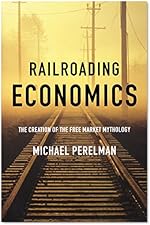Archive for May, 2016|Monthly archive page
Inhuman humans
The Supreme Court case which supposedly decided to corporations should be treated as human beings never did so, although the Supreme Court clerk who summarized decisions claimed that the court had made such a decision. Not Long ago Frank H. Easterbrook and Daniel R. Fischel, the former a federal judge as well as a senior lecturer at the University of Chicago School of Law, wrote:
It is not true, however, that there is a legal duty to enforce every legal right
…. Managers do not have an ethical duty to obey regulatory laws just because
those laws exist. They must determine the importance of these laws. The
penalties Congress names for disobedience are a measure of how much it
wants firms to sacrifice in order to adhere to the rules: the idea of optimal
sanctions is based on the supposition that managers not only may, but also
should violate the rules when it is profi table to do so. [Easterbrook and
Fischel 1982: 1171 and 1177 n]
Richard Posner, another influential federal judge, who is also a
prolific author and a senior lecturer at the same University of Chicago
School of Law as Fischel, made a similar assertion (Posner 1986).
When Milton Friedman, the University of Chicago colleague of
these legal scholars, had proposed that the only responsibility that
corporations have is the duty to maximize profits without taking any
social concerns into consideration, within the bounds of the law, his
position was controversial. A few decades later, federal judges, along with Milton Friedman, proposed that the obligation to earn profits overrides the law.
During the height of the scandal involving Enron’s multibilliondollar frauds, a Wall Street Journal opinion piece entitled “Corporations Aren’t Criminals” noted: “Under the common law, a corporation could not be guilty of a crime because it could not possess mens rea, a guilty mind” (Baker 2002). Sadly, the author was correct — at least insofar as the current courts are concerned.
The mens rea defense is even stronger than the insanity defense. People judged to be insane often face incarceration while corporations go scot-free, even those that profit from the incarceration of others.
Finally, if corporations are mindless, and do not need to fallow laws, why do they deserve the same rights as good citizens. Oh yes, in a democracy — one dollar one vote.
 Comments (5)
Comments (5)
 25 – The Confiscation of American Prosperity: From Right-Wing Extremism and Economic Ideology to the Next Great Depression
25 – The Confiscation of American Prosperity: From Right-Wing Extremism and Economic Ideology to the Next Great Depression 30 – Manufacturing Discontent: The Trap of Individualism in Corporate Society
30 – Manufacturing Discontent: The Trap of Individualism in Corporate Society Class Warfare in the Information Age
Class Warfare in the Information Age Railroading Economics: The Creation of the Free Market Mythology
Railroading Economics: The Creation of the Free Market Mythology Steal This Idea: Intellectual Property Rights and the Corporate Confiscation of Creativity
Steal This Idea: Intellectual Property Rights and the Corporate Confiscation of Creativity The Invention of Capitalism: Classical Political Economy and the Secret History of Primitive Accumulation
The Invention of Capitalism: Classical Political Economy and the Secret History of Primitive Accumulation The Perverse Economy: The Impact of Markets on People and the Environment
The Perverse Economy: The Impact of Markets on People and the Environment